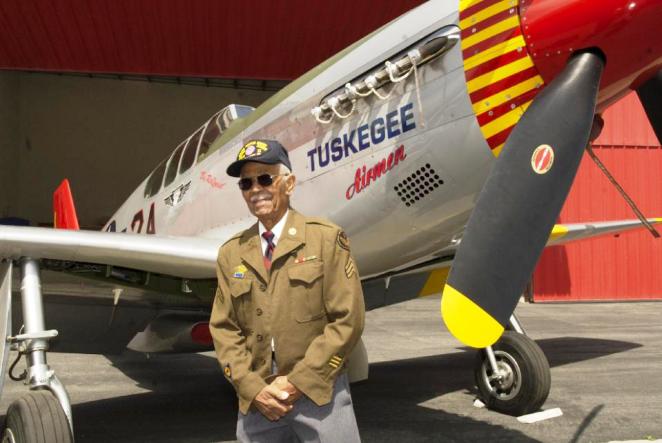Last week, the Associated Press reported (Jan. 11), that two members of the famed 100th Fighter Squadron also known as the Tuskegee Airmen, died on the same day.
Lifelong friends, Joseph Shambrey and Clarence Huntley (pictured), enlisted in 1942 and were shipped overseas to Italy in 1944. Both were mechanics who kept the planes flying.

“Huntley,” the AP writes, “serviced P-39, P-47 and P-51 aircraft, and as crew chief was responsible for the plane of the squadron commander, Capt. Andrew D. Turner, said Huntley’s nephew, Craig Huntly of Inglewood. ‘The life of his pilot was in his hands, and he took that very seriously,’ his nephew said.
“His concern led Turner to nickname him ‘Mother,’ Huntly said.
“In addition to facing danger, the Tuskegee Airmen faced racism.
“Shambrey’s son, Tim Shambrey of Altadena, said his father recalled getting off a train in Alabama where a hospitality station was welcoming returning white troops with handshakes and free coffee. ‘When he and his buddies came off, dressed in their uniforms, of course they didn’t get any congratulations’ and were asked to pay for their coffee, Shambrey said.”
Reading the story reminded me of another veteran from that same group, Art Harmon. Harmon, who volunteered for the Army Air Corps while in high school, submitted a response to my book, What Do You Stand For? in 1999. His training ultimately resulted in an assignment as a pilot with the Tuskegee Airmen. While attending Pepperdine College in California, Lt. Harmon was recalled to active duty during the Korean conflict where he saw duty in the Strategic Air Command, Far East Air Force and other assignments. After the war, Harmon served as a member of the San Francisco Bay Chapter of the Tuskegee Airmen, Inc. and worked on a variety of projects to help “at risk” kids until his death in 2006. His response focuses on the importance of perseverance, an important aspect of responsibility.
“One principle that has been a guiding light, almost an obsession – the no compromise position I have adhered to for as long as I can remember – is to respect the dignity of others regardless of my relationship with them. The difficulty of applying that principle in every situation is apparent but I think that the formula for successful interaction throughout a lifetime depends upon your ability to access each encounter based on your acknowledgement of worth regardless of a conflict of ideas.
“As an African-American, I am tested almost daily on my principle. However, I have found strength, not by turning the other cheek, but by stubborn determination to achieve in spite of obstacles, real or imagined.
“As a young aviation cadet in Macon County, Alabama in 1943, I was made aware of a local sheriff whose hatred of Negroes was legendary. As long as we confined our activities to the campus, we were fine. But, as soon as you went off campus, you could feel the atmosphere change. When the sun went down, you best be either on campus or on the military installation someplace. There were indications of harassment and beatings if you were out after dark.
“I think it’s important to set goals for yourself. At the time, my goal was graduating from aviation school. If the obstacle is a sheriff in a local town, I avoid the sheriff. I won’t confront him because he’s not part of my goal. So, I try to eliminate that obstacle by avoiding it.”
Note to Readers: Beginning this week, I will be posting twice a week while I complete another long term project.
Comments










